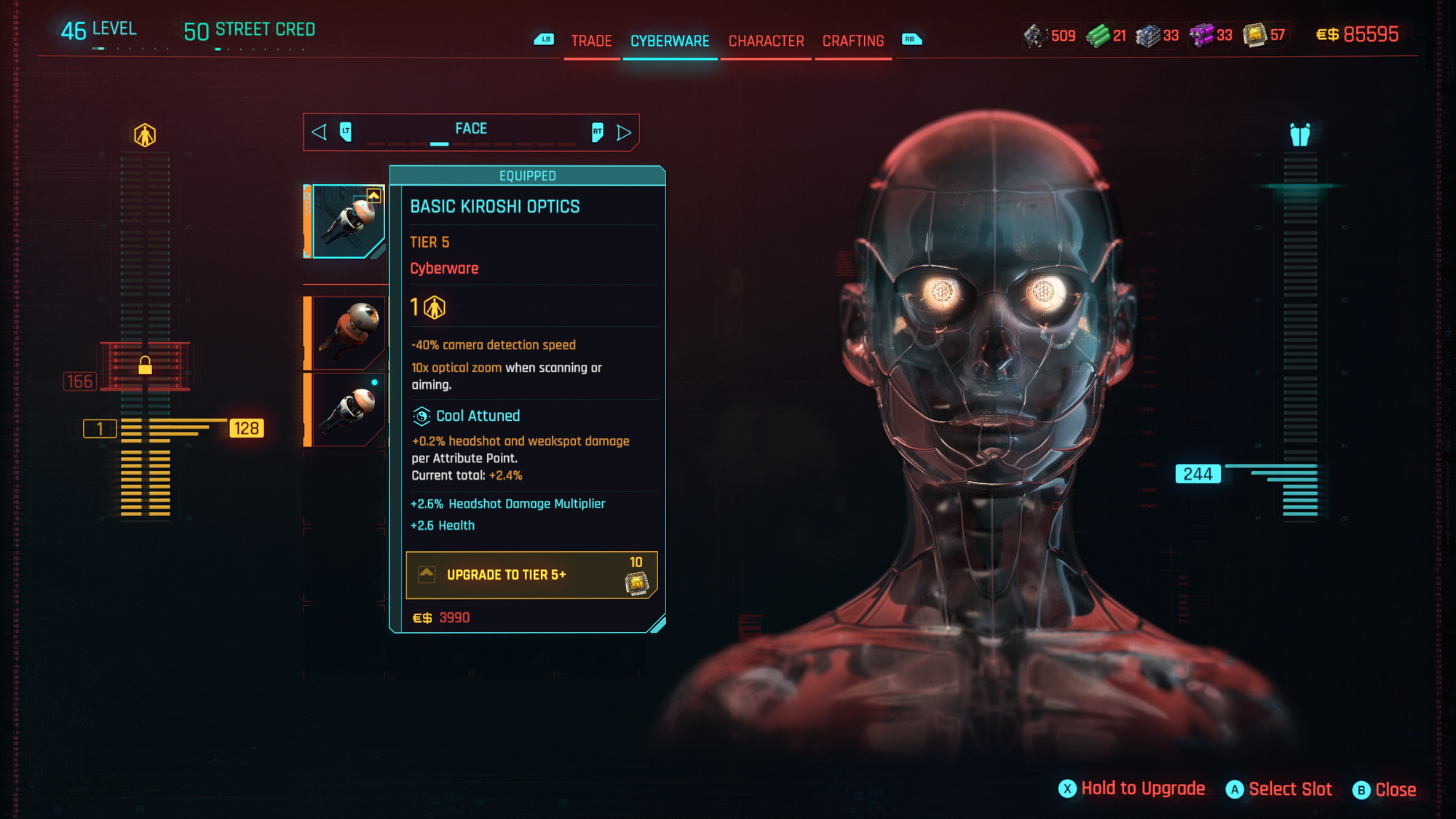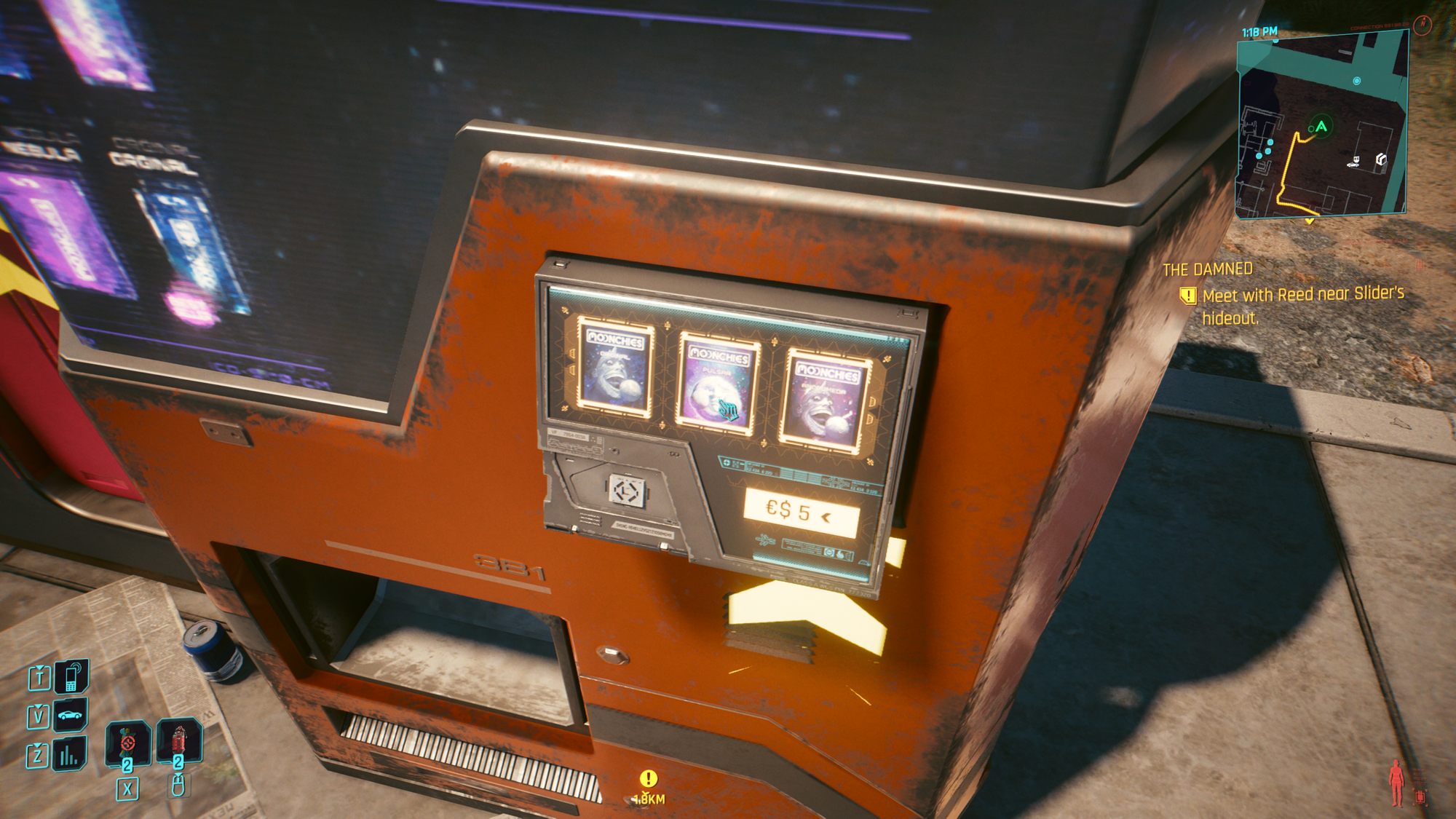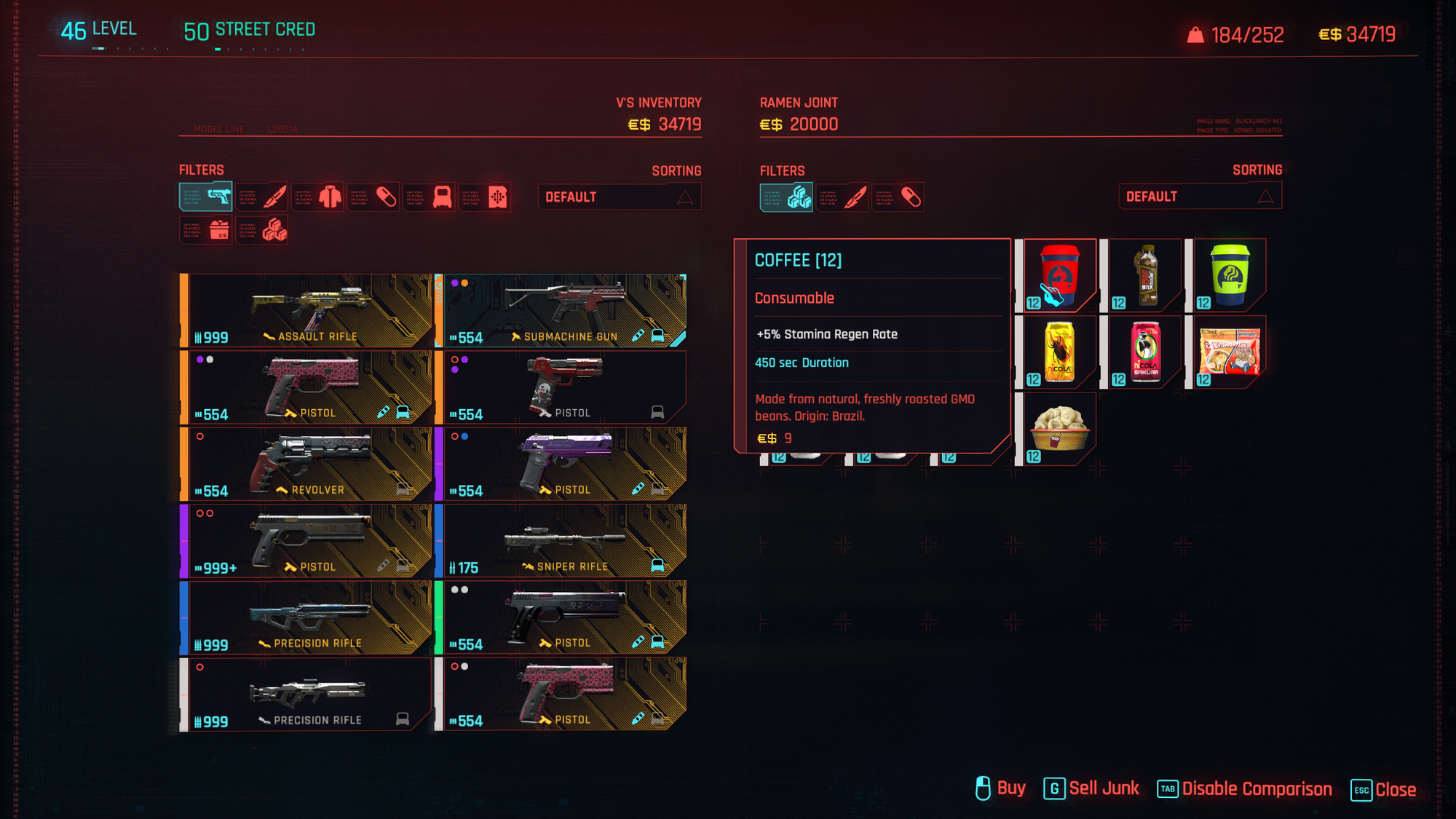Could you afford a robot body if you lived in Night City?
Despite implants being everywhere in Cyberpunk 2077, the economy has some holes.

The status value of cybernetic implants in Cyberpunk 2077 is confusing to me. At times it feels like everyone in the city has implants, but their main purpose is to commit serious, violent crimes. They cost a fortune, yet a bunch of dialogue asserts it's weird for people to have none.
So, are they a symbol of prestige, or a utilitarian necessity? Am I cool for having robot eyes, or is that like bragging about owning comfortable shoes? To really work out how affordable electro-charged knife arms are for normal people, we need to know more about money in this world.
Let's look at Night City's economy.
Food and drink
Our first stop is one of the many, many vending machines. Cyberpunk 2077 has more vending machines than any non-Yakuza video game ever made, and they all sell appropriately cyber versions of real world items. Snacks, energy drinks, disposable guns. That makes them perfect for a zero point on how much things might cost in the city. A spine that alters the fabric of spacetime is neat, but there's not much to compare with.
One of them sells bags of moon chips, which I assume are basically just chips with a large marketing budget. Another sells ready made burritos; the future is magical.

Moon chips are 5 eurodollars. The eurodollar (€$) is the currency du jour in Cyberpunk 2077; the in-world explanation for this involves a lot of economic and social turmoil, but the gonk-level explanation is that the European Union is more stable than America in financial terms, so the eurodollar is a more stable currency. This means that, while the economy of Cyberpunk's universe is as predictable as a handful of change in a blender, the game itself has strict currency values that don't change over the course of the game's story. With that in mind, we can use the €$5 chips as a baseline for working out the cost of living in Night City.
Buying an 8 ounce bag of chips at a Walmart in California today will cost you US$3-4. Moon chips don't seem particularly fancy in comparison to the other snack foods available—everything in Cyberpunk 2077 is some flavour of extra—so we can assume they're on the cheap end of that.
US$3 for a bag of chips in 2024 to €$5 in 2077. According to the US Bureau of Labor Statistics, snack prices have gone up around US$2 since the 1970s, meaning another mere $2 increase by 2077 might be a little optimistic. But we don't have any clear information about the exchange rate for the eurodollar, so we'll just have to trust them. This gives us a way to compare today's prices to the game's future, and get a percentage value:
From here we can do some basic maths to predict how much other things might cost—inflation changes aren't uniform across all goods and services, we're taking a few liberties. A 20 pound bag of rice (US$11 at Walmart) would be €$18.33, a US$12 movie ticket would cost €$20, a queen-sized gel memory foam mattress ($489 at Walmart) comes to €$815. A Starbucks caffè latte that costs US$4.95 now would run you €$8.30 in Cyberpunk 2077's marketplaces.
Coffee does actually exist in Night City and is available for purchase at a few food vendors. I bought some from a ramen restaurant in one of the many food markets for €$9, not too far from our estimate, which hopefully means we're on the right track.

Fancy automobiles
Food prices alone won't tell you the state of your economy, as any conservative politician will tell you, so let's look for something a bit more expensive. Something luxury-class. You can purchase apartments in Night City, across various districts: Northside for €$10,000, Japantown for €$30,000, even one in Corpo Plaza for a preem €$110,000. Unfortunately, as might be obvious from the low prices, this isn't buying the property outright, meaning we can't compare this to 2024 real estate prices. The game tells us this is "renting" a property, but also states you're paying a one-time fee, so there's not much point matching these numbers with rentals either. It's worth noting that you don't really come across anyone with a decent home except the incredibly rich and the outrageously corrupt, so at the very least we can assume home ownership is a silly dream for most residents. The more things change.
Cars, on the other hand, are plentiful and available for flat cash rates. You can buy all sorts of vehicles in Cyberpunk 2077, from sleek sports cars, to beefy motorcycles, to surprisingly utilitarian vans. Some of them even have their own guns.
We don't need to get overly Mad Max with our choices, though, so let's start with the Rayfield Caliburn. Why? Well, it's one of the fastest and most expensive cars in the game. It also has a real-world voice actor providing the engine noises: a Lexus LFA. Taking a look at this Lexus, it's not hard to assume this is what CD Project RED had in mind with the design of the Caliburn. When it came out, the Lexus LFA went for around $400,000.
The Rayfield Caliburn costs the player €$135,000. Hm.
Something a little more modest, the Makigai Maimai P126, is available at a mere €$22,000. It's reportedly based on a Fiat 126p, a car that cost around GB£500 in the 1970s, or USD$1,250 at 1970s-era exchange rates. If we were to assume a Maimai P126 would have sold for similar prices in Cyberpunk 1973 (economists, don't message me about this) then the inflation rate from 1973 to 2077 is-
Okay, fuck that.
Recently, a patch for Cyberpunk 2077 added the Porsche 911 Turbo Cabriolet (930) to the game, able to be purchased for €$73,000. The Cabriolet is also, mercifully, a real car. In 2023 you could grab one for about US$197,150. That's, uh... that's way more than Cyberpunk's prices. So either some horrific market crash devalued cars and property—two of the most reliably expensive and sought after commodities—or CD Project RED just decided that it wasn't all that fun to have to earn millions of eddies so you could actually engage with the game mechanics. You see a similar but opposite problem in a game like Dungeons & Dragons, where adventurers earn enough doing one silly little quest to buy an entire village outright and pay the residents to wash their feet.

Night City's average salary
Let's stick to our food calculations for the most part, and assume the basic necessities in Night City offer a clearer picture of the economy. We can also take a wild and unsubstantiated guess at the average earning power in the city with the information we have now.
Normally, average wages in a region are calculated with a lot of complex statistics and some knowledge of the country's Gross Domestic Product. This is a video game about Keanu Reeves being a terrorist. We do not have that data. But we do know how much a cup of coffee costs, and how much a popular form of transport costs. Sadly, the NCART metro system is free for players, otherwise that would be another useful data point. Never mind!
The cost of consumer goods is, broadly speaking, based on the buying power of citizens. That means a society which produces €$9 coffee and €$5 chips should be populated by people earning enough to buy those things, just as our current society theoretically allows people to afford food and drinks.
So, we should be able to take today's average salaries and apply the same inflation rate we did for the coffee to get a Night City salary. Because we're ignoring every other complexity, and assuming a wild and crazy world where wages actually increase as a result of inflation. According to Unbiased.com, the average salary in San Francisco is US$167,663, which undoubtedly includes a lot of rich gonk assholes screwing up the statistics. The far more accurate median salary for California is US$78,672, roughly the price of one moderately fancy Cyberpunk apartment.
Since we're asking whether getting robot bits is even mildly feasible in Night City, it's also important to know what the low end of the scale might be. The minimum wage for California is US$16 an hour, or US$33,280 per year on a 40 hour work week. Keep in mind that a dystopian hell world like Cyberpunk 2077 or present day capitalism may do its best to scrap silly things like the minimum wage. But for now we'll assume they exist.

Local salaries, adjusted for Night City inflation:
Grabbing some chrome
Now we're getting somewhere. Let's say you're an ordinary person in Night City, and you want to kit yourself out with useful cyberware robochunks. We're not talking about super cool mercenaries here, or underground hackers, just everyday folks who need to get a technological advantage.
Most of the ripperdoc upgrades in-game are completely useless for normal people, considering they do things like "restore my health after murdering someone" and "hide a whip in my arm that can electrocute people." What we're looking for are a few less psychotic examples, upgrades that could be useful in a more general sense. Titanium bones, for example, increases your carrying capacity, which could be very handy in a job focused on manual labour, like construction. Bionic lungs increases your stamina, which could have any number of uses in sport or to improve the health of those with breathing difficulties. Fireproof coating does what it says on the tin, and would be ideal for emergency services.
If a construction worker wanted the stronger bones and better lungs option, that would cost them €$2,000.
Assuming a present day salary of near US$60,000, which works out to US$1,100 weekly, our imaginary cyberbuilder is going to earn €$1,800 each week in Night City. Maybe a little more, given how often building explode. Just over a whole week's salary may seem like a lot on the surface, but they could probably save up for this sort of upgrade with a little budgeting and patience. An iPhone 15 Pro costs US$999, and it doesn't even make your bones cool.
Think for a second about that minimum wage worker, though. Maybe they work in one of the many tacky fast food restaurants, or they service the fast travel machines. €$55,467.78 is only €$1,066 a week. Cost of living calculations currently put a living wage in California at about US$21 an hour, which is significantly less than our worker would be earning. Given that Night City is even more visibly divided along class and economic lines, it's safe to say they're not getting even the most low budget cyberware unless they go without food. Or turn to crime.

And that's without even considering people with children to look after. The chance of being able to take advantage of such technology drops to zero extremely fast once you earn less than the average.
Let's not forget, as well, that the price of these implants escalates very quickly as well, and our construction worker would quickly be priced out based on the above numbers. If an employer has to choose between him and the next guy—who grew up rich and is kitted out with fortified ankles (€$45,000)—then he's fucked. Much as the current world disadvantages people who can't keep up with computer technology, or hinders anyone who relies on public transport over the expensive freedom of a car, Cyberpunk 2077's Night City will inexorably become a land of the implanted and of the forgotten. I didn't start this very mathematical train of thought wanting to end on such a downer, so... sorry about it. But we live in a capitalist nightmare world where a very stupid, unhinged, racist billionaire is trying to put microchips into people's brains. A silly video game didn't make that up, it's just a thing that is happening.
So yeah, it should be quite common for Cyberpunk players to come across folks without implants, because this is a society rampant with poverty and being a good, moral, upstanding poor person would make it impossible to get any cyberjunk at all.
Cyberpunk 2077 has very little to explicitly say about this inequality. It's loud and philosophical about the dangers of technology as they relate to the self, the ways that a tech-obsessed, narcissistic society creates sociopathic behaviour; and it has characters literally shout about the horrors of capitalism on a grand scale. You've got a city to burn, etcetera.
It's mostly quiet when it comes to the victimised masses, not killed in the streets by gangs or cruelly experimented on by vicious corporations, just left behind. There's no place for the poor in Night City. But that's how it works in our world too.
